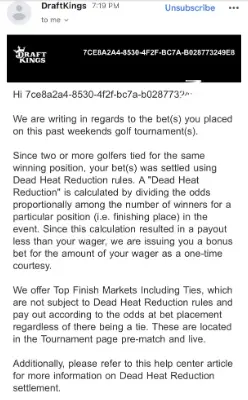Have you received an Email from Draftkings saying they are writing in regards to the bets you placed on this past weekends Golf tournament? Do you want to find out if it is a scam or legit mail? Read this review to find out!
What The Draftkings Scam Email Looks Like

Draftkings Scam emails are phishing attempts designed to trick recipients into giving away personal information, login credentials, or payment details. These emails often mimic official communication from Disney Plus but contain subtle signs that reveal their fraudulent nature.
In the case of the Draftkings Scam Email, so many people are complaining of receiving an email from Draftkings, a popular betting platform, even people who have no account with this platform also received the message. What the scammers do is they send an email claiming you placed a bet over the weekend. This email is sent to various people, including those that do not even have an account with Draftkings. This is a phishing Scam
How To Identify Phishing Scams Like The Draftkings Scam Email
Now here is how to identify Phishing attempts like the Draftkings Scam Email:
- Generic Greetings: Legitimate companies usually address you by name. Be cautious of emails that use generic terms like “Dear Customer.”
- Urgency and Threats: Scammers often create a sense of urgency to rush you into action without thinking.
- Suspicious Links: Hover over any links before clicking. The actual URL may differ from the legitimate DraftKings website.
- Poor Grammar: Watch for grammatical errors or awkward phrasing that might indicate a scam.
- Unsolicited Requests: DraftKings will never ask for sensitive information like passwords or payment details via email.
How To Avoid Scams Like The Draftkings Scam Email
- Always double-check the URL and sender’s information before clicking on links or downloading attachments.
- Contact the organization directly using official contact information, not through the contact details provided in the suspicious message.
- Install and maintain up-to-date antivirus and anti-malware software.
- Enable browser extensions that warn you about phishing sites or block malicious downloads.
- Use 2FA for your accounts to add an extra layer of security.
- Question the legitimacy of emails, texts, or calls that are out of the ordinary, even if they appear to come from known contacts or organizations.
- Use Spam Filters: Set up spam filters to block suspicious faxes and emails.
- Report Scams: Report any fraudulent invoices to the appropriate authorities, such as the Federal Trade Commission (FTC) in the United States.
How Not To Fall A Victim Of The Draftkings Scam Email
- Be skeptical of unsolicited emails claiming to be from Draftkings
- Verify with DraftKings: Contact DraftKings directly using official channels to verify the email’s legitimacy.
- Verify the email’s authenticity by checking the sender’s address and looking for signs of phishing, such as misspellings or generic greetings.
- Report the Email: Forward the suspicious email to DraftKings’ official support or your email provider as a phishing attempt.
- Keep your antivirus software up to date and run regular scans to detect potential threats.
Avoiding phishing scams requires vigilance and awareness. Here are some effective ways to protect yourself from phishing attacks:
Tips to Avoid Phishing Scams:
- Be Skeptical of Unexpected Communications:
- Be cautious with unsolicited emails, texts, or calls, especially those asking for personal or financial information.
- Verify the Source:
- Always verify the sender’s email address or phone number. Scammers often use addresses or numbers that look similar to legitimate ones.
- Look for Red Flags:
- Check for spelling and grammatical errors, generic greetings (e.g., “Dear Customer”), and urgent or threatening language.
- Don’t Click on Suspicious Links:
- Hover over links to see the actual URL before clicking. If it looks suspicious or doesn’t match the purported sender, don’t click it.
- Check the Website’s Security:
- When entering personal information online, ensure the website is secure. Look for “https://” in the URL and a padlock icon in the browser’s address bar.
- Avoid Downloading Attachments:
- Don’t open email attachments from unknown or suspicious sources. These could contain malware.
- Use Multi-Factor Authentication (MFA):
- Enable factor Authentication on your accounts so as to add an extra layer of security. This makes it harder for scammers to gain access even if they have your password.
- Report Phishing Attempts:
- Report suspicious emails to your email provider and the organization being impersonated. In the U.S., you can forward phishing emails to the Anti-Phishing Working Group at [email protected] and to the FTC at [email protected].
What Do You Do When You Suspect A Phishing Attempt
In this digital age and time, almost everyone has at one time received a phishing text or email and often times they fall victim and get scammed. This is why it is imperative that you are always careful when you receive any text or email because one careless click on a link can cause a whole lot of problems for you. Now if you suspect a phishing attempt, here is what I advise you do:
- Do Not Respond to the text, because you responding is actually giving access to the scammers, simply delete it when you receive.
- Quickly change your password if you have mistakenly clicked on the link or given away your login details. Change your password to a strong and unique password.
- Keep an eye on your accounts for any unauthorized transactions.
- Also scan you devices for any malware.
By following these tips, you can significantly reduce your risk of falling victim to phishing scams and keep your personal and financial information safe.
Conclusion
This internet age came with so many advantages and also disadvantages. Phishing is an example of one of such. Internet users should always apply caution and be wary. Scammers often use scare tactics or urgency to manipulate individuals into taking quick actions. It’s essential to stay vigilant and take precautions too.